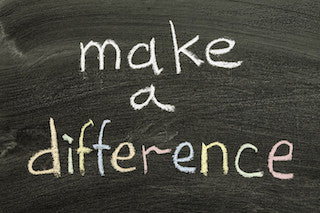Think about the past twenty four hours. How many times did you complain about something?
In today's world, complaining has become a way of connecting with others. Unfortunately, it's not a positive or lasting type of connection. For school teachers/administrators/staff, connecting by complaining is especially toxic. In theory most of us know that what we say, think and do affects the outcomes and the atmosphere of our environment. Unfortunately, most of us do not apply this theory to our lives. The challenge? Go 24 hours without uttering a single complaint – you can think complaints, but try to eliminate those too. (Ready. Set. Go. I'll wait.)
Okay, you're done. How did it work out? It's hard, isn't it? But, admit it, you felt good keeping your complaints to yourself. (Okay, maybe you even felt a little virtuous and smug, but that's okay.) Did this exercise make you think it might be a worthwhile challenge to offer the teachers/administrators/staff at your school? Maybe set up a collection jar where someone who does complains has to donate “x” amount? At the end of the challenge you can use that money for something fun for the whole group to share. (Be sure to set up a new collections jar because someone is bound to complain about the reward at the end of the challenge!)
Once you start tracking your own complaints, you'll notice how complaining affects your life. If you are a teacher or work at a school, imagine how basing most of your conversations on what's wrong might affect your attitude in the classroom and how that might rub off on your students. If you're approaching things looking for what's wrong, others around you will follow suit. Negativity is contagious, not to mention addictive as our brains begin to crave the neurochemicals complaining brings about.
Give yourself another challenge. Try not only to NOT complain each day, learn to dig underneath what you want to complain about and develop the skill of self-agency, where you connect to your feelings and needs. What are you feeling? Acknowledge it as being valid. What needs, met or unmet, are underneath the feeling/s? Is there a way you can meet those needs another way? Or ask others to help you meet your needs – it’s a lot more powerful than asking them to listen to your complaints. It takes some practice and creativity but, you will notice the change in your mindset and you will also see a change in your colleagues. As you change, they will more and more try to match your self-agency approach. It might not be conscious on their part but it will happen. It's hard to push your complaints when you're talking to someone who is taking self-aware approach.
Start with the challenge and work from there. Often just being aware of how frequently complaining is the basis of so many discussions is enough of a push to get you started on a more reflective path
. Seek out others with the same positive outlook and avoid those who see nothing but problems. After a month, reflect on the changes for the better that you're seeing in your life – personal and professional. You'll be amazed.
Aroha nui
Jean
Teacher, Relational Neuroscience, Mindfulness
and Conscious Communication Facilitator.

